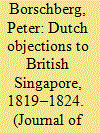|
|
|
Sort Order |
|
|
|
Items / Page
|
|
|
|
|
|
|
| Srl | Item |
| 1 |
ID:
171999


|
|
|
|
|
| Summary/Abstract |
This article addresses the proactive agency of the Siamese kings in cementing commercial and diplomatic ties with the Dutch in the first two decades of the seventeenth century. The focus will be on two interrelated developments: one, the first diplomatic mission to the Dutch Republic in 1608–1610 and, two, a scheme hatched by Siamese officials to assist the Dutch in obtaining access to the Chinese market. This was deemed necessary after the Dutch, supported by some overseas Chinese businessmen from Southeast Asia, failed to gain trading access in 1604. On the Dutch side, two men stand in the limelight: Admiral Cornelis Matelief de Jonge, a director of the Dutch East India Company (VOC) and supreme commander of its second fleet to Asia, and Hugo Grotius, who at the time was a rising star in the Dutch government and would later be celebrated as one of the pathfinders of modern international law. Both their published and unpublished manuscripts will be examined to ascertain how Matelief and the VOC directors reacted to these Siamese initiatives and how, in turn, the admiral sought to mobilize and co-opt the Siamese into his own commercial and military agenda, with the help of Grotius.
|
|
|
|
|
|
|
|
|
|
|
|
|
|
|
|
| 2 |
ID:
173382


|
|
|
|
|
| Summary/Abstract |
The year 1819 is almost universally taken as a seminal date in Singapore historiography. Yet Stamford Raffles’ founding of a British trading post there was controversial from the start. The Dutch and the British haggled as to whether or not Raffles had overstepped his authority, and whether the trading post was legal. From the start, the Dutch demanded that the British quit their occupation of Singapore. During a three-year hiatus in the Anglo–Dutch negotiations (1820–23), Anton Reinhard Falck, the lead Dutch negotiator, decided to drop claims to Singapore in favour of a rearrangement of possessions in the archipelago. Crucially, he concluded that dropping claims over Singapore would not amount to a real loss. Instead, Falck hoped to use Singapore as a bargaining chip to squeeze additional concessions from the British. The Dutch formally relinquished their claim over Singapore in article 12 of the Anglo-Dutch Treaty, which gave full recognition and legitimacy to the British post, and sanctioned a breakup of the Johor-Riau Empire with the Singapore Straits acting as a notional dividing line. Earlier studies were substantially based on English-language materials and present the British as dominating the negotiations. The present article, based on Dutch archival materials as well as studies and sources in French, Dutch and English, reveals a fuller story of diplomatic disputes, territorial concessions, errors of judgement, and the triggering of the Dutch empire in the archipelago, in a paper war for the contested space of Singapore.
|
|
|
|
|
|
|
|
|
|
|
|
|
|
|
|
| 3 |
ID:
100144


|
|
|
| 4 |
ID:
155463


|
|
|
|
|
| Summary/Abstract |
Cornelis Matelieff de Jonge (also Cornelis Cornelisz. Matelief) was a director of the Dutch East India Company (VOC) and fleet commander of a voyage to the East Indies in 1605–08. On his return to the Dutch Republic in September 1608, he wrote a series of epistolary memorials, or ‘discourses’, in which he recommended sweeping reforms in the way in which the VOC conducted business in Asia. Not only did these recommendations serve as a blueprint for subsequent developments of the VOC during the early seventeenth century, the documents also made astute observations about the dynamics of trade, geopolitics, agency of the Asian rulers as well as political power on the Malay Peninsula, Java, Maluku and Borneo. This article problematises these primary sources and demonstrates how they can be profitably mined for the history of trade and diplomacy of early seventeenth century Southeast Asia.
|
|
|
|
|
|
|
|
|
|
|
|
|
|
|
|
| 5 |
ID:
175548


|
|
|
|
|
| Summary/Abstract |
A century ago, research on the Malay world was experiencing major breakthroughs on several fronts, but the greatest achievement at the time was without doubt George Coedès’ ‘rediscovery’, based on Asian sources, of a forgotten kingdom named Srivijaya. His book, published in 1918, saw a wave of publications follow in its wake. Sources were trawled in the hope of finding answers to unresolved issues and unidentified place names. Attention invariably also fell on Melaka. In a long article published by the French academic and diplomat Gabriel Ferrand in the same year, the question of Melaka's founding date came under the spotlight. What do the different surviving sources tell us? What about Gaspar Correia's claim that Melaka was a thriving port city for centuries before the arrival of the Portuguese? Was the city — just as in the case of Temasek (Singapore) — known by a different name in earlier times? Ferrand's publication provoked a response from the Dutch academic Gerret Pieter Rouffaer, director of the KITLV. What he planned to be a 20-odd page response to Ferrand swelled into a multifaceted argument running into hundreds of pages. The debate between Ferrand and Rouffaer that touched on Melaka and Temasek-Singapura's early history probably eluded most of their academic contemporaries who were not proficient in both Dutch and French, especially in the English-speaking world. The present article reconstructs the main points of this debate together with their echo in historiography. It makes a contribution to the ongoing discourses, especially in Malaysia, concerning the founding date of Melaka.
|
|
|
|
|
|
|
|
|
|
|
|
|
|
|
|
|
|
|
|
|